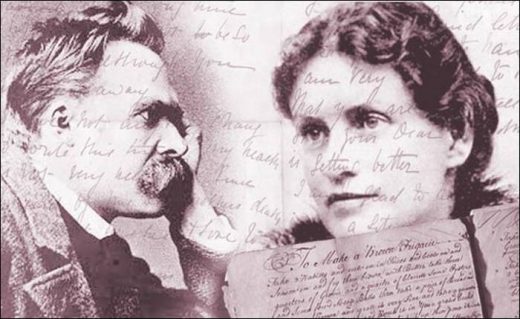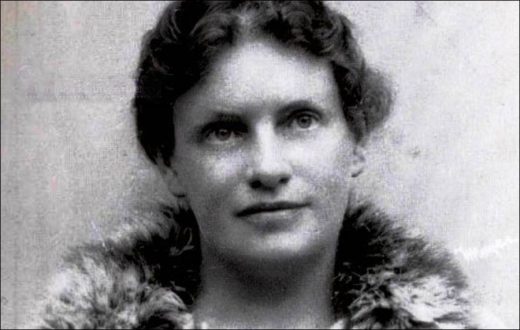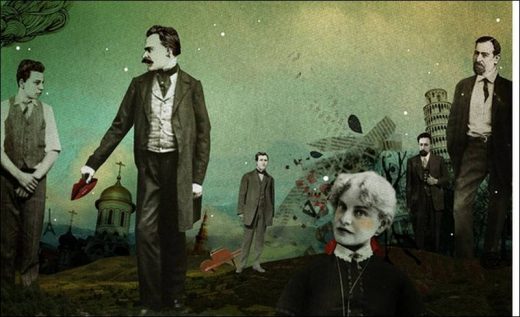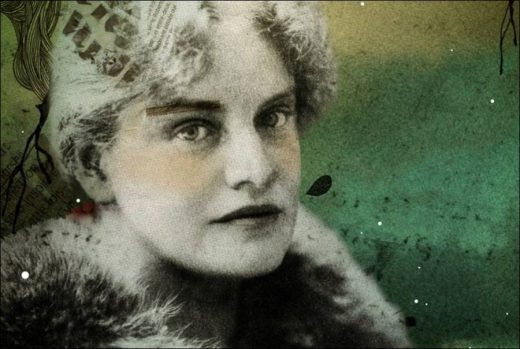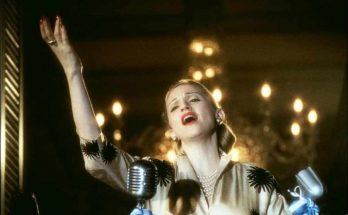“…The world doesn’t offer you gifts, believe me. If you want a life, steal it…” These words belong to Lou Andreas-Salome, who left valuable works in the fields of religion-love and psychology, but suffered the brutal lash of masculine history. Salome, who was remembered for her relationships with intellectual men in her century and, unfortunately, was shown as the cause of all the negativities experienced by these men, was one of the most unfair women in history.
Lou Andreas-Salome, who expresses her passion for freedom at every opportunity and is told through the eyes of others, not with her contributions to the intellectual world with her books, articles and ideas, is one of the women whose patriarchal history does not give any information about her.
The Historical lynch to Salome
When we ask a simple question “Who is Lou Andreas-Salome?”, The definitions and adjectives we come across are nothing but indicators of historical relevance: “He is famous for seducing the famous thinkers of the period”, “For the sake of the intellectual circles of the period; “The legendary love of Nietzsche, who attracts attention with her beauty and insolent behavior”, “The whipped woman who refused Nietzsche’s marriage proposal and deeply influenced Freud and the poet Rilke”, “The reason why Nietzsche is a misogynist…”
Whatever the wisdom of at least 10 intellectual men who lived in the 19th century, it is the ‘devil’ itself that plays a negative role in the lives of … It was written that way, as before, Lilith collaborated with the devil because she wanted to be equal with Adam and was thrown out of heaven, and instead ‘Eve’ was created from the rib of the man. ‘which also caused the expulsion of humanity from paradise by not being’ comfortable ‘and feeding Adam the forbidden apple.
Salome’s story is a version of the masculine myth of history adapted to capitalism in our brains. Salome, the poet-writer-psychoanalyst-philosopher of the century he lived in, did not care much except the definition of “seducer woman”. Her fellows simply criticized her for the feminist thinking of her time and for not speaking about women.
For this reason, she was exposed to the deepest part of injustice, as perhaps one of the most objectified women in history, despite having thoughtfully producing ideas on being an individual and subjectivation. Many people recognize Salome as the “daring, seductive blond” woman in the book “When Nietzsche Cries”, the intellectual who first seduces men and then plays with them, causing them to lose their mental health.
However, when you examine his relations with these famous men, beyond his thoughts and productions, we see that he experienced the passion for freedom not only in his age but beyond in this age we live in. So what was the real story of Salome, the “seductive devil woman” of masculine history with mystery, fantasy and exaggeration? If we try to describe Salome, who defines dealing with the subject as her special passion, as a subject:
She wrote 19 books, 15 of those are novels
Salome, who has written hundreds of articles in the fields of love, religion, philosophy and psychology, published 19 books, 15 of which are novels. She was a female philosopher whom she challenged with the words “I stick to memories but never to a man”, whom the patriarchy tried to objectify with a vengeance.
‘God died today and no longer lives’
Lou Andreas Salome, a Sephardic Jew whose family immigrated to Russia, was born on February 12, 1861 in St. He was born in St. Petersburg. His father was a general in the Russian army, while his mother was an aristocrat who loved extravagant parties. From an early age, he grew up to be an independent man who did not listen to laws and rules. In his childhood he did not accept strict religious rules, and for him, God was someone to be friends with, to discuss together and even to obey. When he was 17, he had this conversation with his mother: “God is dead today, he is no longer alive…”
She became interested in human relationships at a very early age. He was a dreamer. It was far from the image of the woman her mother wanted to show. The first person to set the direction of her life was Hendrik Gillot, a priest twenty-five years older than him. He became interested in philosophy and literature through discussions with Gillot. It is said that Gillot dictated some Sunday rituals to this young woman whose ideas he haunted.
Her first novel: My War with God
She went to Zurich at the age of 19, despite her family’s unwillingness, as women in her country are forbidden to have higher education. Many women working in the intellectual field in Russia were educated at the University of Zurich this period. Salome studied theology, philosophy and art history here. At the age of 24, he wrote his first novel, “My War with God”.
He went to Italy in 1882, where he was a housemate with the writer Maldivia von Meysenburgu, who was a close friend of his mother. Maldivia became the embodiment of the idea that a free life is a woman’s right and duty for Salome.
Here Friederich met Nietzsche and rejected Nietzsche’s marriage proposal, greatly influenced by their conversations on philosophy and theology. Salome considered the bodily attraction to the marriage or fidelity relationship limiting freedom, so she avoided such relationships throughout her life. The intellectual friendship he wanted was just to solve the mystery of life and the resonance of freedom. Whereas, all the intellectuals he met during his period – not so different today – could not overcome traditional stereotypes when it comes to women.
That is why, upon the lack of a positive response from Salome, he gained Nietzsche’s deep hatred and came across the insulting titles “This dry, dirty, smelly monkey is a disaster with his lying breasts.”
According to Salome, marriage was the killer of love, and married spouses became “unimportant to each other”. Love is very low in friendship; friendship had to be protected from the risk of extinction by turning into love and, worse, sexuality, saying, “There is no way from bodily passion to spiritual sympathy, but from the second to the first.”
A life out of tradition
Setting life and human relations to the basis of his philosophy, Salome lived a life that did not conform to tradition. He said “yes” to those who require marriage to maintain their friendship, provided that they live within their own rules. Therefore, the legend is that, despite being married twice, he had his first sexual experience at the age of 38 with poet Rilke, 17 years younger than him. He moved to Berlin in 1903 and was part of an art group for a while, during this period he wrote articles in various art magazines. The most important work he created in this period was “Women of Ibsen”.
“Love strives to its own death”
Salome, who was interested in psychoanalysis, moved to Vienna after a while and wrote a letter to Freud recommending that he wanted to work together. When he started working with Freud, the subject that most interested him was narcissism. Describing dealing with the subject as his special passion, Salome’s most well-known and most original work emerged from his works of this period, “Erotic”.
In his work, which consists of four articles on love between man and woman, he argued that love is not directed at a man or a woman. According to Salome; in love we are not filled with another as we think. We are filled with ourselves, our own situation. We are hugging ourselves, not anyone else. Love strives to its own death. If love gives up this goal, it lives as an unrealized effort. For Salome, loyalty plays an important role in the destruction of love itself by hindering freedom.
The past in the intellectual centers of the century in which he lived in St. Petersburg, Vienna, Berlin, Munich and Paris; A seventy-six-year life devoted to art, writing, philosophy, novels, poems, plays, philosophical writings, scientific studies, a woman who clung to thinking, writing and legislation.
Perhaps Salome’s greatest misfortune was that men in the male-dominated intellectual world were subjected to judgments that do not transcend the traditional, while what he did in philosophy and intellectual sphere deserves to be remembered.
For some she has never been a feminist
However, he was also subjected to the same trials from the women’s front. For some, Salome has never been a feminist. But Lou Andreas-Salome regarded herself as equal to her in all human relationships, be it with men or women. He had never thought he had a shortage of men. When he was seventeen, he wrote a bold letter to Father Hendrik Gillot, a popular cleric, expressing his desire to learn from him, or when he conceived an intellectual tripartite model with Paul Ree and Nietzsche when he was twenty-one, he saw himself on a par with these men.
In fact, this attitude marked his entire life. Salome never saw the need and made no effort to prove or establish herself as a person, a woman, a writer, or a thinker. Salome said that her life was governed by a “sense of necessity similar to the functioning of natural forces”, but in fact this feeling, which she called necessity, was nothing more than her self-esteem. Perhaps it was this self-confidence and the naturalness it brought that attracted and connected the people around him.
‘If I let my thoughts go, my mind wouldn’t find anyone’
Salome, who lived her life with the same naturalness and productivity, died in Germany on February 5, 1937. The last words he said before he died were once again an autonomous prophecy:
If I let my thoughts free, my mind wouldn’t find anyone. After all this has happened, the best thing is to die.
“If you want a life, steal it”
What he said before he died was actually the life and eternity he mentioned in the poem he wrote when he first went to Zurich at the age of 21:
“…The world doesn’t offer you gifts, believe me. If you want a life, steal it… Exist! And think! For thousands of years…”
Angela Livingstone’s work “Salome: Her Life and Works”, which is one of the books that deals with Salome in terms of her true identity rather than the history of lynching, in the form of who is what and with whom, deals with all aspects of her life. The book, which removes the injustice of masculine history to a woman who is passionate about the subject, tells about her not as someone’s lover or friend, but as an independent person, thinker and writer.
Views: 276
